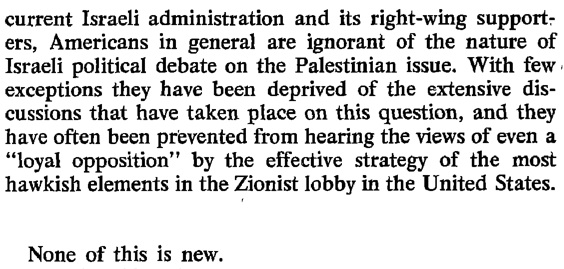Noam Chomsky’s essay on the Boycott, Divestment, Sanctions movement, published in the next issue of The Nation, references the American veto of a UN resolution in January 1976, favoring a two-state solution to the long-festering dispute between Israel and the Palestinians. At the time, The Nation was only beginning to publish articles critical of Israeli policy in the occupied territories; in the 1940s, it had prominently advocated the establishment of a Jewish state in Palestine and supported Israel at practically every point since. In an editorial published early in February 1976, the editors supported the Ford administration’s veto at the UN, but argued against its proposed reductions in military aid to Israel.
Yet one week later, The Nation published what was then its most critical article on the subject. Written by Irene Gendzier, professor of history at Boston University, “The Israeli Debate We Never Hear” could in large substance be reprinted with equal relevance today.


Gendzier’s essay concludes with a warning that American policy in thrall to the bellicose delusions of the Israeli right risked losing touch with the reality of the conflict.

Gendzier’s article represented a turning point in The Nation’s coverage of Israel and Palestine. By the time a special issue titled “Myths About the Middle East” was published in December 1981—with contributions from Edward Said, Christopher Hitchens, Edward Mortimer, Michael Reisman and others—a definite change had occurred. But in the first half of 1976, the magazine’s position remained fairly ambiguous. Gendzier’s essay met with a strong, if tacit, rejoinder in the May 1 issue, which contained an essay by the veteran Middle East journalist Frank Gervasi titled “Myths and Realities: The Rights of the Palestinians.” The first sentence sets the tone: “In the mephitic clouds of propaganda generated by Arab spokesmen…”
* * *
Curious about how we covered something? E-mail me at [email protected]. Subscribers to The Nation can access our fully searchable digital archive, which contains thousands of historic articles, essays and reviews, letters to the editor and editorials dating back to July 6, 1865.


